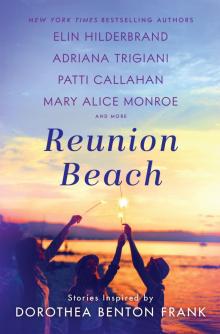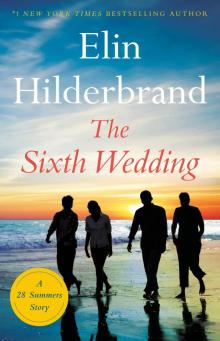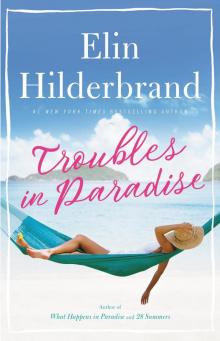- Home
- Elin Hilderbrand
What Happens in Paradise
What Happens in Paradise Read online
The characters and events in this book are fictitious. Any similarity to real persons, living or dead, is coincidental and not intended by the author.
Copyright © 2019 by Elin Hilderbrand
Cover design by Lauren Harms
Cover photograph by cdwheatley / Getty Images
Author photograph by Nina Subin
Cover © 2019 Hachette Book Group, Inc.
Hachette Book Group supports the right to free expression and the value of copyright. The purpose of copyright is to encourage writers and artists to produce the creative works that enrich our culture.
The scanning, uploading, and distribution of this book without permission is a theft of the author’s intellectual property. If you would like permission to use material from the book (other than for review purposes), please contact [email protected]. Thank you for your support of the author’s rights.
Little, Brown and Company
Hachette Book Group
1290 Avenue of the Americas, New York, NY 10104
littlebrown.com
twitter.com/littlebrown
facebook.com/littlebrownandcompany
First ebook edition: October 2019
Little, Brown and Company is a division of Hachette Book Group, Inc. The Little, Brown name and logo are trademarks of Hachette Book Group, Inc.
The publisher is not responsible for websites (or their content) that are not owned by the publisher.
The Hachette Speakers Bureau provides a wide range of authors for speaking events. To find out more, go to hachettespeakersbureau.com or call (866) 376-6591.
ISBN 978-0-316-43556-7
E3-20190822-DA-NF-ORI
Table of Contents
Cover
Title Page
Copyright
Dedication
Author’s Note
Part One: A Rooster and Two Hens
Part Two: Lawyers, Guns, and Money
Part Three: The Soggy Dollar
Part Four: Christmas Cove
Acknowledgments
Discover More
About the Author
Also by Elin Hilderbrand
This novel is for St. John, U.S. Virgin Islands—the island itself and
everyone who lives there.
Thank you for the revelry, and
thank you for the refuge.
Explore book giveaways, sneak peeks, deals, and more.
Tap here to learn more.
Author’s Note
What Happens in Paradise is the second book in a planned trilogy. While this book can, most certainly, be read as a stand-alone, a richer and more textured reading experience will be had by starting with book one, Winter in Paradise.
In the author’s note in Winter in Paradise, I explained that the St. John portrayed in the novel is the one that existed before September of 2017, when Hurricanes Irma and Maria created such widespread devastation. There are businesses and restaurants mentioned in both books that now exist only on my fictional St. John. Thank you.
Part One
A Rooster and
Two Hens
Irene
She wakes up facedown on a beach. Someone is calling her name.
“Irene!”
She lifts her head and feels her cheek and lips dusted with sand so white and fine, it might be powdered sugar. Irene can sense impending clouds. As the sun disappears, it gains a white-hot intensity; it’s like a laser cutting through her. The next instant she feels the lightest sprinkling of rain.
“Irene!”
She sits up. The beach is unfamiliar, but it’s tropical—there’s turquoise water before her, lush vegetation behind, a rooster and two hens strutting around. She must be back on St. John.
How did she get here?
“Irene!”
A man is calling her name. She can see a figure moving toward her. The rain starts to fall harder now, with intention; the tops of the palm trees sway. Irene dashes for the cover of the tree canopy and wishes for a towel to wrap around her naked body.
Naked?
That’s right; she forgot to pack a swimsuit.
The man is getting closer, still calling her name. “Irene! Irene!” She doesn’t want him to see her. She tries to cover up her nakedness by hunching over and crossing her arms strategically; it feels like an impossible yoga pose. She’s shivering now. Her hair is wet; her braid hangs like a soggy rope down her back.
The man is waving his arms as if he’s drowning. Irene scans the beach; someone else will have to help him because she certainly can’t. But there’s no one around, no boats on the horizon, and even the chickens are gone. There will be a confrontation, she supposes, so she needs to prepare. She studies the approaching figure.
Irene opens her mouth and tries to scream. Does she scream? If so, she can’t hear herself.
It’s Russ.
She wipes the rain out of her eyes. Russell Steele, her husband of thirty-five years, is slogging toward her through the wet sand, looking as though he has something urgent to tell her.
“Irene!”
He’s close enough now for her to see him clearly—the silvering hair, the brown eyes. He has a suntan. He’s had a constant tan since he started working for Todd Croft at Ascension, thirteen years ago. Their friends used to tease Russ about it, but Irene barely noticed, much less questioned it. He was on business in Florida and Texas; the tan seemed logical. She had chalked it up to lunch meetings at outdoor restaurants, endless rounds of golf. How many times had Russ told her he would be unreachable because he’d be playing golf with clients?
Now, of course, Irene knows better.
“Irene,” he says. His voice frightens her; she digs her heels into the sand. Russ’s white tuxedo shirt is so soaked that she can see the flesh tone of his skin beneath. His khaki pants are split up one leg. He looks like he’s survived a shipwreck.
No, Irene thinks. Not a shipwreck. A plane crash. A helicopter crash, that’s it.
“Russ?” she says. He’s getting pummeled by rain, and Irene flashes back twenty years to a Little League game of Baker’s that was suspended due to a violent midwestern thunderstorm. All the parents huddled in the dugout with the kids, but Russ, in a show of gallantry, ran out onto the field to collect the equipment. Another father, Steve Sonnet (Irene had always rather disliked Steve Sonnet), said, Reckless of him, picking up those metal bats. He’s going to get himself killed.
There was another time she remembers Russ soaking wet, a wedding in Atlanta. The Dunns’ daughter Maisy was marrying an executive at Delta Airlines. This was five or six years ago, back when Irene and Russ found themselves attending more weddings than they had even when they were young. The reception was held at Rhodes Hall, and when she and Russ emerged from the strobe-lit dance floor and martini bar, it was to a downpour. Again, Russ insisted on playing the hero by tenting his tuxedo jacket over his head and dashing across the parking lot to their rental car. When he’d pulled up to the entrance a few moments later, his shirt had been soaked through, just like this one is now.
“The storm,” Russ says, “is coming.”
Well, yes, Irene thinks. That much is obvious. It’s a proper deluge now, and the darkest clouds are still moving toward them. “I thought you were dead,” she says. “They told me…” She stops. She’s speaking, but she can’t hear herself. It’s frustrating. “They told me you were dead.”
“It will be a bad storm,” Russ says. “Destructive.”
“Where should we go?” Irene asks. She turns to face the trees. Where do the chickens hide from the rain? she wonders. Because she would like to hide there too.
At eight o’clock on the dot, Irene wakes Cash. He has started calling her Mother Alarm Cloc
k.
“I had another dream,” she says.
Cash props himself up on his elbows in bed. His blond hair is messy and he’s growing a beard; he hasn’t shaved since they left the island. Irene has put him in the grandest of her five guest rooms, the Excelsior suite, she calls it. It has dark, raised-panel walls with a decorative beveled edge at the chair rail and an enormous Eastlake bed with a fringed canopy. There’s also a stained-glass transom window that Irene got for a steal at a tiny antiques shop in Solon, Iowa, and a silk Persian rug in burgundy and cream that she purchased from a licensed dealer in Chicago. (She’d thought Russ might veto a five-figure rug, but he told her to go ahead, get it, whatever made her happy.) Irene’s favorite piece in the room is a wrought-iron washstand that holds a ceramic bowl edged in gold leaf; above it hangs a photograph of Russ’s mother, Milly, as a young girl in Erie, Pennsylvania, in 1928. Irene remembers the joy and pride she’d felt in refurbishing this room—every room in the house, really—but at this instant, she can’t understand why. The Victorian style seems so heavy, so overdone, so tragic.
Irene has abandoned the master bedroom; she will never be able to sleep there again. Since she returned from St. John, she’s been using the smallest guest room, originally meant to be quarters for a governess. It’s up on the third floor, across from the attic. The attic is crammed with the bargains Irene scored at flea markets but couldn’t find a place for in the house along with all the furniture from their former home, since Russ refused to let her take it to Goodwill. Russ had remarked many times that he would have been just as happy staying in their modest ranch on Clover Street, and Irene had thought him crazy. Of course, that was before she realized that Russ had a second life elsewhere.
The governess’s room had been all but neglected in the renovation. Irene had simply painted the walls sky blue and furnished it with a white daybed and a small Shaker dresser. Now she appreciates the room’s simplicity and its isolation. She feels safe there—although she can’t seem to hide from these dreams.
“Dad was alive?” Cash asks.
“Alive,” Irene says. This is the third such dream she’s had since returning from St. John. Irene and Cash and Irene’s older son, Baker, all traveled down to the Virgin Islands upon receiving the news that Russ had been killed in a helicopter crash off the coast of Virgin Gorda. He had been flying from a private helipad on St. John to the remote British island Anegada with a West Indian woman named Rosie Small. Irene then discovered that Rosie was Russ’s lover and that Russ had left behind a fifteen-million-dollar villa and a twelve-year-old daughter named Maia. It was a surreal and traumatizing trip for Irene and her sons, and yet now, a week later, all of these shocking facts have been woven into the tapestry of Irene’s reality. It was incredible, really, what the brain could assimilate. “He was talking about a storm. A bad storm, he said. Destructive.”
“Maybe he meant the lightning storm,” Cash says.
“Maybe,” Irene says. The helicopter had been struck by lightning. “Or maybe it’s what lies ahead.”
“The investigation,” Cash says.
“Yes.” The week before, only a couple days after they’d arrived home from St. John, an FBI agent named Colette Vasco called Irene, Cash, and Baker to let them know that the Virgin Islands Search and Rescue team had contacted the Bureau with suspicions that there might be more to the helicopter crash than met the eye.
What does that mean, exactly? Irene had asked.
The damage to the helicopter doesn’t match up with a typical lightning strike, Agent Vasco said. There was lightning in the area, but the damage to the helicopter seems to have been caused by an explosive device.
An explosive device, Irene said.
We’re investigating further, Agent Vasco said. What can you tell me about a man named Todd Croft?
Next to nothing, Irene had said. She went on to explain that she had tried any number of ways to reach Todd Croft, to no avail. I probably want to find him more than you do, Irene said. She gave Agent Vasco the number that Todd Croft’s secretary, Marilyn Monroe, had called Irene from. Agent Vasco had thanked her and said she’d be back in touch.
More to the helicopter crash than met the eye. An explosive device. This was turning into something from a movie, Irene thought. Yet she suspected that it was only a matter of time before the next dark door into her husband’s secret life opened.
“Also, there were chickens in the dream,” Irene says to Cash. “A rooster and two hens.”
Cash clears his throat. “Well, yeah.”
Well, yeah? Then Irene gets it: Russ is the rooster, Irene and Rosie the two hens.
Other than Cash and Baker, no one here in Iowa City knows that Russ is dead; Irene hasn’t told anyone, which feels like a huge deception, as though she stuffed Russ’s corpse into one of the house’s nineteen closets and now it’s starting to stink. Irene quiets her conscience by telling herself it’s her own private business. Besides, no one has asked! This isn’t strictly true—Dot, the nurse at the Brown Deer Retirement Community, asked where Russ was, and, in a moment of sheer panic, Irene lied and told Dot he was on a business trip in the Caribbean.
And he couldn’t get away? Dot asked. Even for this? Dot was fond of Russ; she cooed over him at his every visit as though he had forded rivers and climbed mountains to get there, although she took Irene’s daily presence at Brown Deer for granted. Irene perversely enjoyed watching the shadow of disillusionment cross Dot’s face when she learned that Russ had put work before his own dying mother.
Russ’s footprint in Iowa City all but disappeared after he took the job with Ascension thirteen years ago. Russ used to know everybody in town. He worked for the Corn Refiners Association and was a social creature by nature. He would drop off Baker and Cash at school and then go to Pearson’s drugstore on Linn Street for a cup of coffee with “the boys”—the four or five retired gentlemen known as the Midwestern Mafia, who ran Iowa City. Russ’s coffee break with the boys was sacred. They were the ones who had encouraged him to run for the Iowa City school board, and they’d suggested he join the Rotary Club, where he eventually became vice president.
All of the boys were now dead, and Russ hadn’t been involved with local politics or the Rotary Club in over a decade. Irene occasionally bumped into someone from that previous life—Cherie Werner, for example, wife of the former superintendent of schools. Cherie (or whoever) would ask after Russ and then add, “We always knew he would make it big someday,” as though Russ were a movie star or the starting quarterback for the Chicago Bears.
But who from Iowa City remained in Russ’s everyday life? No one, really.
Now that the business of Milly’s death has been handled—her body delivered to the funeral home, her personal effects collected, the probate attorney from Brown Deer enlisted to settle her estate—Irene has no choice but to face the daunting task of contacting the family attorney, Ed Sorley, to tell him about Russ.
“Irene!” Ed says. His voice contains cheerful curiosity. “I didn’t expect to hear from you again so soon. Everything okay?”
Irene is in the amethyst-hued parlor, pacing a Persian rug that the same Chicago carpet dealer who’d sold her the Excelsior-suite rug had described as “Queen Victoria’s jewel box, overturned.” (Irene had bought it immediately despite the fact that it cost even more than the other rug.)
“No, Ed,” Irene says. “It’s not.” She pauses. Russ has been dead for ten days and this is the first time she’s going to say the words out loud to someone other than her sons. “Russ is dead.”
There is a beat of silence. Two beats.
“What?” Ed says. “Irene, what?”
“He was killed in a helicopter crash on New Year’s Day,” Irene says. “Down in the Virgin Islands.” She doesn’t wait for Ed to ask the obvious follow-up question: What was Russ doing on a helicopter in the Virgin Islands? Or maybe: Where are the Virgin Islands? “When I called you last week to ask about Russ’s will, he was already dead. I should
have told you then. I’m sorry. It’s just…I was still processing the news myself.”
“Oh, jeez, Irene,” Ed says. “I’m so, so sorry. Russ…” There’s a lengthy pause. “Man…Anita is going to be devastated. You know how she adored Russ. You might not have realized how all the wives in our little group way back when thought Russ was an all-star husband. Anita used to ask me why I couldn’t be more like him.” Ed stops abruptly and Irene can tell he’s fighting back emotion.
Anita should be glad you weren’t more like him, Irene wants to say. Anita and Ed Sorley were part of a group of friends Irene and Russ had made when the kids were small—and yes, Anita had been transparently smitten with Russ. She had always laughed at his jokes and was the most envious on Irene’s fiftieth birthday when Russ hired an airplane to pull a banner declaring his love.
“I need help, Ed,” Irene says. “You’re the first person I’ve told other than my kids. The boys and I flew down to the Caribbean last week. Russ’s body had been cremated and we scattered the ashes.”
“You did?” Ed says. “So are you planning a memorial, then, instead of a funeral?”
“No memorial,” Irene says. “At least not yet.” She knows this will sound strange. “I can’t face everyone with so many unanswered questions. And I need to ask you, Ed, as my attorney, to please keep this news quiet. I don’t even want you to tell Anita.”
There was another significant pause. “I’ll honor your wishes, Irene,” Ed says. “But you can’t keep it a secret forever. Are you going to submit an obituary to the Press-Citizen? Or, I don’t know, post something on Facebook, maybe?”
“Facebook?” Irene says. The mere notion is appalling. “Do I have a legal obligation to tell people?”
“Legal?” Ed says. “No, but I mean…wow. You must still be in shock. I’m in shock myself, I get it. What was… why…”

 What Happens in Paradise
What Happens in Paradise Reunion Beach
Reunion Beach The Sixth Wedding
The Sixth Wedding 28 Summers
28 Summers Summer of '79: A Summer of '69 Story
Summer of '79: A Summer of '69 Story Troubles in Paradise
Troubles in Paradise The Perfect Couple
The Perfect Couple Winter Solstice
Winter Solstice Barefoot: A Novel
Barefoot: A Novel